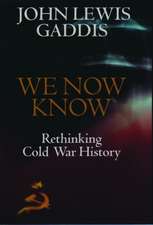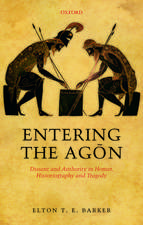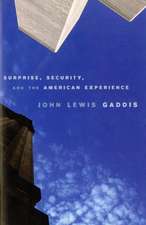The Landscape of History: How Historians Map the Past
John Lewis Gaddisen Limba Engleză Paperback – 8 apr 2004
Preț: 81.13 lei
Nou
Puncte Express: 122
Preț estimativ în valută:
15.52€ • 16.21$ • 12.85£
15.52€ • 16.21$ • 12.85£
Carte disponibilă
Livrare economică 14-28 martie
Livrare express 27 februarie-05 martie pentru 16.55 lei
Preluare comenzi: 021 569.72.76
Specificații
ISBN-13: 9780195171570
ISBN-10: 0195171578
Pagini: 208
Ilustrații: numerous halftones
Dimensiuni: 201 x 135 x 13 mm
Greutate: 0.16 kg
Editura: Oxford University Press
Colecția OUP Oxford
Locul publicării:Oxford, United Kingdom
ISBN-10: 0195171578
Pagini: 208
Ilustrații: numerous halftones
Dimensiuni: 201 x 135 x 13 mm
Greutate: 0.16 kg
Editura: Oxford University Press
Colecția OUP Oxford
Locul publicării:Oxford, United Kingdom
Recenzii
"These engaging and accessible lectures describe why history matters. Non-historians who want to learn more about the field will find the book illuminating, and historians will learn from the tools provided."--The San Francisco Chronicle
"A masterful statement on the historical method by a distinguished Cold War historian.... Gaddis' most provocative claim is a powerful irony: Social science, with its independent variables and deductive theories, would appear to have more scientific pretensions than does history. But the historical method, which relies on thought experiments and the interplay of inductive and deductive reasoning, more fully shares the methodical logic of such fields as astronomy, paleontology, and evolutionary biology. Gaddis' characterization of the social sciences will surely spark debate even as it illuminates important intellectual connections between the disciplines. Delightfully readable, the book is a grand celebration of the pursuit of knowledge."--Foreign Affairs
"A bold and challenging book, unafraid of inviting controversy. It provides a strong statement for our time of both the limits and the value of the historical enterprise."--Alan Brinkley, New York Times Book Review
"Never before have I come across a book that so illuminated the craft of the historian.... Gaddis has a delightful command of language--and a delight in it. He draws on Gertrude Stein, Mark Twain, contemporary movies, Thucydides, Tom Stoppard, Woody Allen and lots more.... He is a distinguished scholar who writes with a clarity and a lack of pedantry that is quite marvelous. Equally impressive, he's not afraid of a rip-roaring fight with his fellow academics."--Michael Pakenham, The Baltimore Sun
"In 'The Landscape of History,' Mr. Gaddis, the author of several distinguished books on the cold war, both pays homage to Bloch (and with more conditional admiration, to the British historian E.H. Carr) and addresses the challenge of postmodernism. He does all of this in an urbane and eloquent little volume that, in its way, might even be what Bloch himself would have written had he lived.... Mr. Gaddis's learned and graceful reflections on all of these questions are deeply humane, propelled by the conviction that only by sustaining a historical consciousness can we know where we should want to go. They will also never allow either the reader of history or the writer of it to think about the past in quite the same way as before."--Richard Bernstein, New York Times
"This is another of those books that rewards the effort it requires. Besides providing invaluable insights into how the historian goes about his business, it teaches--like all really good books--of life beyond its boundaries."--Colin Walters, Washington Times
"A technical but provocative inquiry for sophisticated history readers."--Booklist
"Entertaining, masterful disquisition on the aims, limitations, design, and methods of historiography.... Employing a wide range of metaphors (from Cleopatra's nose to Napoleon's underwear), displaying an extensive knowledge of current thinking in mathematics, physics, and evolutionary biology, alluding frequently to figures as disparate as Lee Harvey Oswald, Gwyneth Paltrow, John Lennon, and John Malkovich, Gaddis guides us on a genial trip into the historical method and the imagination that informs it.... Provocative, polymathic, and pleasurable."--Kirkus Reviews
"The Landscape of History explores recent, surprising convergences of natural science and human history and does so with clarity, charm and easy erudition. Gaddis's book is a real tour de force: a delight to read, and a light-hearted celebration of the odd, 'fractal' patterns that intellectual and other forms of human and natural history exhibit."--William H. McNeill
"A masterful statement on the historical method by a distinguished Cold War historian.... Gaddis' most provocative claim is a powerful irony: Social science, with its independent variables and deductive theories, would appear to have more scientific pretensions than does history. But the historical method, which relies on thought experiments and the interplay of inductive and deductive reasoning, more fully shares the methodical logic of such fields as astronomy, paleontology, and evolutionary biology. Gaddis' characterization of the social sciences will surely spark debate even as it illuminates important intellectual connections between the disciplines. Delightfully readable, the book is a grand celebration of the pursuit of knowledge."--Foreign Affairs
"A bold and challenging book, unafraid of inviting controversy. It provides a strong statement for our time of both the limits and the value of the historical enterprise."--Alan Brinkley, New York Times Book Review
"Never before have I come across a book that so illuminated the craft of the historian.... Gaddis has a delightful command of language--and a delight in it. He draws on Gertrude Stein, Mark Twain, contemporary movies, Thucydides, Tom Stoppard, Woody Allen and lots more.... He is a distinguished scholar who writes with a clarity and a lack of pedantry that is quite marvelous. Equally impressive, he's not afraid of a rip-roaring fight with his fellow academics."--Michael Pakenham, The Baltimore Sun
"In 'The Landscape of History,' Mr. Gaddis, the author of several distinguished books on the cold war, both pays homage to Bloch (and with more conditional admiration, to the British historian E.H. Carr) and addresses the challenge of postmodernism. He does all of this in an urbane and eloquent little volume that, in its way, might even be what Bloch himself would have written had he lived.... Mr. Gaddis's learned and graceful reflections on all of these questions are deeply humane, propelled by the conviction that only by sustaining a historical consciousness can we know where we should want to go. They will also never allow either the reader of history or the writer of it to think about the past in quite the same way as before."--Richard Bernstein, New York Times
"This is another of those books that rewards the effort it requires. Besides providing invaluable insights into how the historian goes about his business, it teaches--like all really good books--of life beyond its boundaries."--Colin Walters, Washington Times
"A technical but provocative inquiry for sophisticated history readers."--Booklist
"Entertaining, masterful disquisition on the aims, limitations, design, and methods of historiography.... Employing a wide range of metaphors (from Cleopatra's nose to Napoleon's underwear), displaying an extensive knowledge of current thinking in mathematics, physics, and evolutionary biology, alluding frequently to figures as disparate as Lee Harvey Oswald, Gwyneth Paltrow, John Lennon, and John Malkovich, Gaddis guides us on a genial trip into the historical method and the imagination that informs it.... Provocative, polymathic, and pleasurable."--Kirkus Reviews
"The Landscape of History explores recent, surprising convergences of natural science and human history and does so with clarity, charm and easy erudition. Gaddis's book is a real tour de force: a delight to read, and a light-hearted celebration of the odd, 'fractal' patterns that intellectual and other forms of human and natural history exhibit."--William H. McNeill
Notă biografică
John Lewis Gaddis is the Robert A. Lovett Professor of Military and Naval History at Yale University. A leading authority on Cold War history, his books include We Now Know, The Long Peace, and Strategies of Containment.










